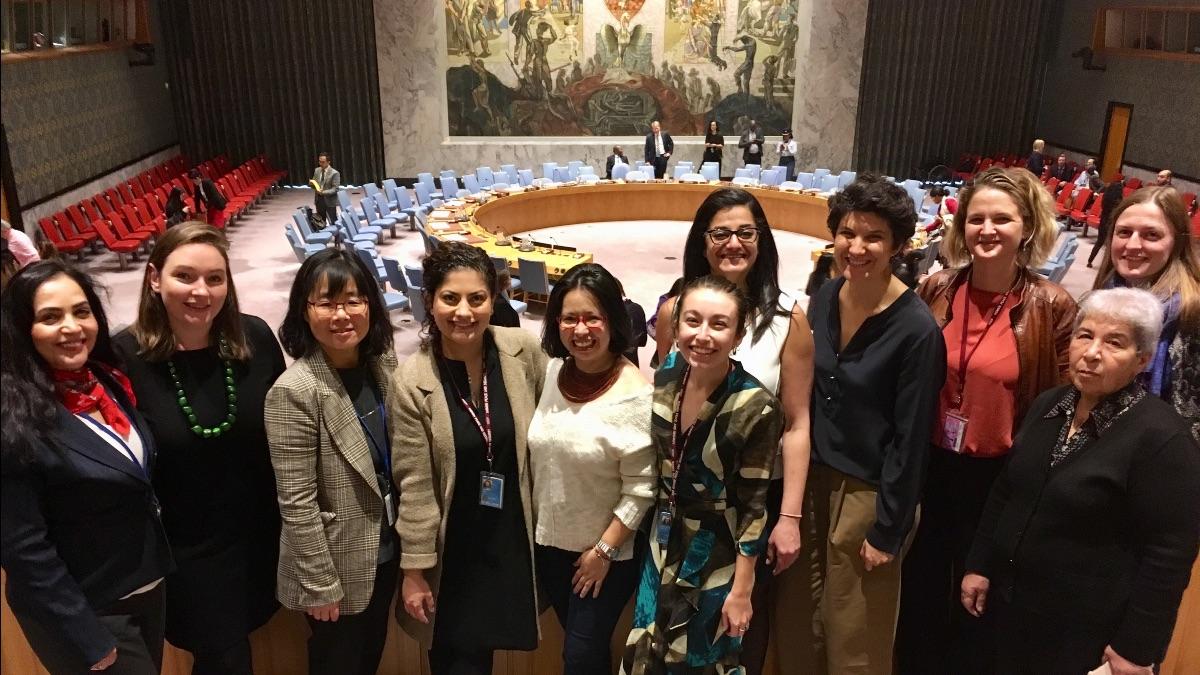Our Women, Peace and Security Advocacy and Monitoring Work at the United Nations in 2019
United Nations Security Council Monitoring and Advocacy
In 2019, our advocacy continued to push for a shift in the Security Council’s implementation of the WPS Agenda, which goes beyond gender parity to strengthening women’s meaningful participation; the importance of addressing disarmament and respect for and protection of human rights as key elements of conflict prevention; increased recognition of gender inequality as a root cause of sexual violence in conflict and the need to shift from words to concrete action that has impact on women’s lives.
In 2019, the NGO Working Group on Women, Peace and Security facilitated the statements of 12 women civil society briefers to the Council. With the Group, WILPF provided technical support to 3 women civil society speakers to the Security Council in 2019 including from Afghanistan, Libya, and Syria. The Informal Expert Group on WPS also continued to take up WILPF priority recommendations, including on Afghanistan, DRC, and Yemen.
We monitored the open debates on sexual violence in conflict, protection of civilians, and women, peace and security. We additionally monitored geographic discussions on silencing the guns in Africa, the April and Julymeetings on Colombia, and the June and September meetings on Afghanistan among other meetings on Yemen, the DRC, Syria, and Lebanon. WILPF also launched our updated Security Council WPS Scorecard, which highlights the domestic implementation of the WPS agenda on the part of the Permanent Five members.
The WILPF Secretary-General brought attention to disarmament and WPS at the April WPS Focal Points Network meeting in Namibia, and the WILPF WPS Director briefed on the issue of disarmament and sexual violence in conflict at the February German Federal Foreign Office Workshop on WPS.
Women, Peace and Security and Sustainable Development
Outside the Security Council, in 2019, our advocacy supported a broader shift to focus on an integrated approach across the UN. This was done especially by leveraging the Sustainable Development Goals (SDGs) and 2030 Agenda to promote policy coherence and coordination for sustainable development that works for women and girls in conflict-affected areas.
As a Global Organising Partner of the Women’s Major Group on Sustainable Development, WILPF advocated for increased solidarity among women peace activists and women’s rights activists for addressing root causes, as well as recognition by the 2019 Global Sustainable Development Report (GDSR) of current failures to deal with deeply-rooted inequalities, military spending, and arms proliferation as key gaps for realising the SDGs.
We participated in the Women’s Major Group campaign #FeministDemand in alignment with our own campaigns, #WomenLead2030 and #MovetheMoney.
Our Programme Director was the author of the chapter on SDG 16 (peaceful, just and inclusive societies) in the annual Spotlight on Sustainable Development report entitled, “Governing for Gender Equality and Peace? Or Perpetual Violence and Conflict?”. This report was launched at a widely-attended event during the July HLPF.
WILPF monitored both the July and September sessions of the High-Level Political Forum on Sustainable Development. We published a feminist analysis of the July High-Level Political Forum, with a particular focus on the first review of SDG 16 on peaceful, just, and inclusive societies. We also published a separate analysis specifically of the SDG16 discussions. In September, we monitored the SDG Summit at the UN General Assembly for discussions of policy coherence, integrated approaches to implementing the SDGs, and broader peace and conflict issues.
To strengthen calls for an integrated approach to the SDGs, WILPF spearheaded an Open Letter to the Group of Friends of 1325 with recommendations for the September 2019 UN General Assembly High Level Political Forum (HLPF) Sustainable Development Summit.
63rd Commission on the Status of Women
In March 2019, we monitored the 63rd Commission on the Status of Women, where we focused our work on calling for and envisioning feminist political economies of peace. This included hosting discussions on feminist analysis of post-war reconstruction, the role of masculinities and militarism in realizing the transformative intent of the WPS Agenda, and the launch of our coalition KoreaPeaceNow! campaign.

